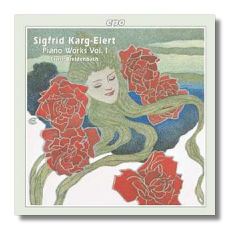
The Internet's Premier Classical Music Source
Related Links
- Latest Reviews
- More Reviews
-
By Composer
-
Collections
DVD & Blu-ray
Books
Concert Reviews
Articles/Interviews
Software
Audio
Search Amazon
Recommended Links
Site News
 CD Review
CD Review
Sigfrid Karg-Elert

Piano Works, Volume 1
- Hexaméron, Op. 97
- Bagatellen, Op. 17
- Arabeske, Op. 5
- Schwere Düfte W 48
- Walzer-Capricen for piano duet, Op. 16 *
- Partita, Op. 113
Ernst Breidenbach, piano
Werner Hoppstock, Piano*
CPO 999683-2 DDD 78:04
Sigfrid Karg-Elert (1877-1933) must have been a happy and optimistic man, as most of the music here exhibits a sunny disposition. Even in its more serious moments, meant to depict yearning and passion, the mood is generally upbeat. Actually, some of these works border on love music, or at least are expressions of very intimate friendship. The first of the six pieces comprising the 1920 Hexaméron, is entitled Erotikon and is dedicated to "To my friend Miss Adrienne Voigt." That's a most curious title for a composition dedicated to only a "friend," and it becomes a more curious one with the revelation that the only thing known about the woman is that she served as a witness at Karg-Elert's marriage ceremony! The remaining five pieces in the set are dedicated to another woman, Gabriella Cologne, who later became a piano student of the composer.
In any event, as suggested above, the moods of these pieces are generally optimistic, even when passion and nostalgia flow forth, as in the closing piece, Ballade. Stylistically, Karg-Elert was a conservative, whose chords often call to mind Debussy (but without the Impressionism) and a kind of updated Schubert or Schumann. The Bagatellen come from 1900 and sound like earlier creations compared with Hexaméron, the emphasis shifting away from anything Debussyan and focusing more on the Germanic school. like the Hexaméron collection, these five pieces are delightful, appealing in their tunefulness and joyous nature. The Cantilene is especially lovely. The Arabeske and Walzer-Capricen are also early works, and distinguish themselves for much the same reasons as the Bagatellen. Schwere Düfte and the Op. 113 Partita are late works and represent the composer at his most creative. The former work is but a miniature, but its expressive language is more advanced than anything here and would certainly belie my description of the composer as a conservative if he had written more works in this vein. The 1922 Partita is generally light, abounding in brilliant colors, vibrant melody, and tangy, if somewhat conventional harmonies.
Pianist Ernst Breidenbach plays with enthusiasm and total commitment, and I can't imagine a stronger advocate in this music. I think he would sound splendid in Schumann or Rachmaninoff. Werner Hoppstock's contribution in the three pieces for duet is also quite fine. cpo's sound is excellent and its notes copious and enlightening. Strongly recommended.
Copyright © 2000, Robert Cummings



















